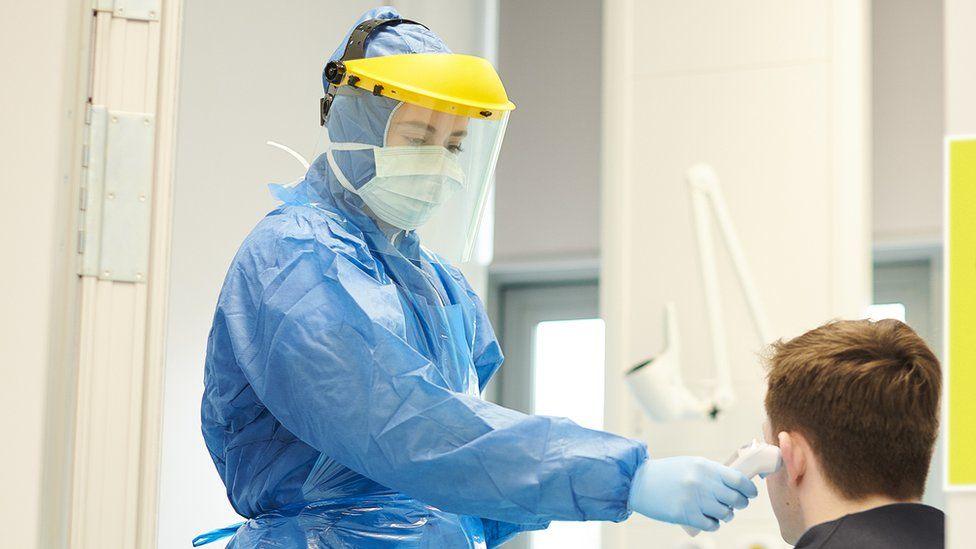Plastic PPE to be recycled in waste-reduction project
- Published
- comments

Hundreds of tonnes of plastic personal protective equipment (PPE) like masks and gloves could be recycled as part of a new waste-reduction project.
Since the start of the pandemic, about 8.4 million tonnes of plastic PPE waste has been generated from 193 countries.
The majority ends up in landfill or, in some areas, dumped at sea.
Now a research partnership between Heriot-Watt University and PPE maker Globus Group hopes to give it "a second life" as new PPE products or fuels.
At the moment, much of the plastic polypropylene PPE waste cannot be recycled mechanically.
It is hoped the new project will develop a process for cost and energy-efficient recycling and repurposing that could be adopted globally.
How does the recycling work?
Using thermal heating technology, a machine heats and compacts the plastic polypropylene into large, reusable blocks.
They are then collected and processed into pyrolysis oil.
This can be used to provide raw materials to create new PPE products - reducing waste by around 85%.
Dr Aimaro Sanna, assistant professor in chemical and process engineering at Heriot-Watt University, said the project was "a significant step towards addressing the increased waste generated during the pandemic".
He added: "Initially, the research will help to recycle over 100 tonnes of product generated by the manufacturing process every year - the equivalent to 10kg of waste every hour.
"However, our hope is that this new process will be adopted more widely.
"Many countries have been unable to process their plastic waste PPE properly.
"Our ground-breaking research aims to address these challenges providing an exemplar technique for application globally."

What is PPE and who should wear it?
Anyone in close contact with patients should wear some form of protection. That includes staff in care homes, prisons and the community, as well as in GP surgeries or hospitals. People giving vaccines will also use PPE.
The type of PPE required depends on the level of risk.
Guidelines say all hospital staff should wear a face mask, while people visiting hospital or attending outpatient departments should wear a face covering.
Face coverings, unlike surgical face masks, are not classed as PPE as they are not usually made to a recognised standard and do not provide a proven level of protection for work.


Since the start of the coronavirus crisis, Globus Group said it had been producing one billion masks for healthcare trusts across the UK.
But the manufacturing process currently results in 7g of waste material per mask.
Pete Lee, head of quality at the company, said the thermal heating machine at its factory in Golborne, near Manchester, "will be a real game changer in the way we tackle our PPE waste".
He added: "This machine is a fundamental part of our process to re-purpose and utilise waste material to achieve a circular economy.
"At Globus Group, we acknowledge our responsibility to the NHS, supporting it in delivering a net zero sustainable future, and the long-term welfare of future generations."
He added that once the research was completed there would be an expansion in its operations in southern Scotland where it has sites in Dumfries and Annan.
It would see the construction of a new facility to turn items like ventilators and masks into a secondary raw material for reuse.
"We will work with Heriot-Watt to design the process - what kind of process needs to work and what the plant needs to look like - and then we will build it in Dumfries," he said.
You might also like...
What can we do about the problem of soft plastics?

